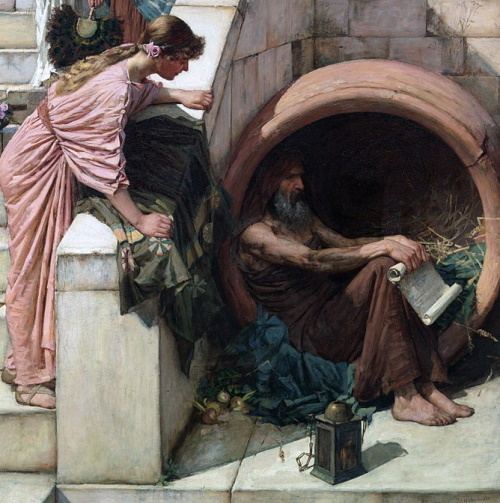
Diogenes by John William Waterhouse (detail)
He set no store by washing, and he was never joshing
When denouncing others’ lies and mental fog.
He said: ‘Hypocrisy’s a feature found in no non-human creature.
My aim’s to live as honest as a dog.’
Some local clever-dick named him a ‘cynic’, and this nickname
(Based on the Greek for dog), would soon take hold.
Did Diogenes reject it? No he’d scornfully accept it,
And told his fans: ‘Be cynics and be bold!’
Lesser souls would feel a terror when he exposed their error
With his total, often scalding, honesty.
He was unafraid to slander even Emperor Alexander.
Our philosopher said: ‘That’s the man for me.’
With Diogenes as model, now whenever he heard twaddle,
He would slate it with unchecked ferocity.
He’d advertise his rightness without kindness or politeness;
'Such niceties,' he sneered, 'are not for me.'
His new uncompromising manner many found surprising;
His ways disturbed established pieties.
He did not live in a barrel, but the topic of apparel
Found him preaching very like Diogenes.
Like his master, he with loathing scorned such fripperies as clothing:
‘It’s unnatural and I feel the need to doff
The trousers that contain me and imprison and restrain me -
Because I think much better with them off.’
The council of the college where he filled young heads with knowledge
Were uneasy about him lecturing in the nude.
The Dean asked: ‘Can’t you figure what anxieties you’d trigger?
Besides the which, it’s very very rude.’
At a meeting of the senate, one prof cried: ‘Gordon Bennet!
Why was this utter fruitcake ever hired?’
They nervously discussed him, and resolved they couldn’t trust him.
So he was ignominiously fired.
Did this make him change his ways now? No, his soul was all ablaze now;
He asked: ‘Did Diogenes go far enough?’
Ever more persistent, more resistant, more consistent,
He upped the ante on the doggish stuff.
Events conspired to try him, but his Isobel stood by him,
And his canine ways at first would make her smile.
She found it unalarming, and even rather charming,
When he expressed affection, doggie-style.
He cultivated habits such as chasing cats and rabbits.
And smelling round about the roots of trees,
But was often just a loafer who would stretch out on the sofa,
Just occasionally scratching at his fleas.
His way of life had dangers; when he sniffed the bums of strangers,
Their reactions would be negative at best.
He gained a reputation for public urination,
And was maybe lucky to escape arrest.
His refusal of convention slowly caused a certain tension
Between the up till now quite happy pair,
And when he took a piddle in the middle aisle of Lidl,
It moved his wife to something near despair.
She cried: ‘You think it’s a lark, it seems, to spray a supermarket.
Can't you see how much you make me grieve.
You’re a philosophic cynic? It’s a psychiatric clinic
Where you belong, I’m starting to believe.’
He accused her of suppression: ‘I’ll not tolerate repression
When all my instincts tell me I should pee.’
Her emotions, which were now strained, made her yell: ‘Get bloody house-trained!’
She slammed the door when leaving, furiously.
He felt it when she bolted; his very soul was jolted,
He acknowledged later, chewing on a bone.
He now was, he admitted, though refusing to be pitied,
A thinker who was utterly alone.
He tried hard to be happy living just on tins of Chappie,
And leftovers from a kindly neighbour's joint.
His digestion might entreaty for a diet far less meaty,
But he said: ‘I’ll be consistent. That’s the point.’
In time his doggish diet proved unhealthy (Do not try it!)
His skin grew blotched, his hair came out in tufts
His breath was ripe and stinking; if you saw him, you’d be thinking:
This one wouldn’t win the Best in Show at Crufts.
Though Isobel no longer lived with him her love grew stronger
For this man who lived the credo he believed.
And she could not keep from pining as she watched his slow declining,
And the ruin that his diet had achieved.
When all around were fearing that his end was surely nearing,
She sat by him; he smiled at her, because
Although his end was surely fated, he by now appreciated
How very doglike her devotion was.
The point I hope you’ve taken is his lifestyle was mistaken,
Of which his sad conclusion was the proof,
Yet his mind remained uncluttered, and the final thing he uttered
Was a feeble and yet still determined ‘Woof.’
George Simmers
